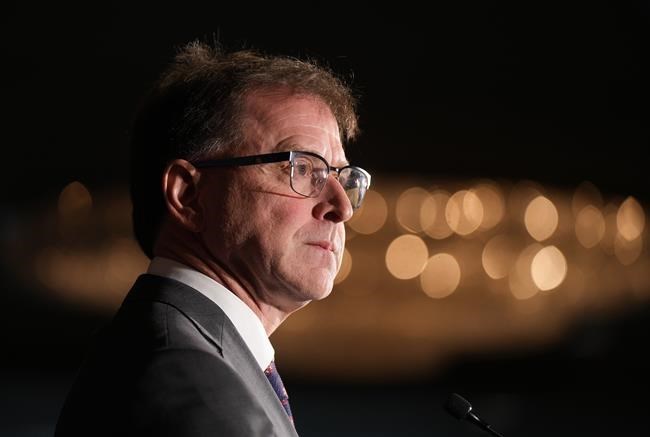
B.C. Health Minister Adrian Dix pauses while responding to questions during a news conference, in Vancouver, on Monday, Nov. 7, 2022. Dix says more than 1,000 family doctors have so far signed on to the province's new compensation model that takes effect Wednesday as part of a plan to address the crisis in the health-care system. THE CANADIAN PRESS/Darryl Dyck
Republished February 01, 2023 - 5:07 PM
Original Publication Date February 01, 2023 - 3:31 PM
VANCOUVER - More than 1,000 family doctors have so far signed onto British Columbia's new compensation model, the health minister said as the plan came into effect Wednesday.
Adrian Dix said that number reflects doctors who signed up in advance or within hours of its launch, and he expects it to grow "dramatically" in the coming weeks.
The province will provide public updates on the number of doctors who switch to the new model as it grows, he said.
The model raises the salary of a full-time family doctor to about $385,000 per year, up from $250,000, in an effort to close the pay gap between family doctors and hospitalists, who are paid close to $300,000 a year to work in hospitals and have the same training but not the overhead costs.
One in five B.C. residents, or about one million people, doesn't have a family doctor.
Dix said the new model developed by the province and Doctors of BC takes aim at that shortage by addressing challenges in the existing fee-for-service system.
That system has forced family physicians to become business people, which is especially unappealing to many younger doctors, he told a news conference.
The new model aims to reduce the administrative burden family doctors face, he said, allowing them to spend more time with their patients and compensating them for spending extra time, especially with patients who have complex needs.
It's a "fundamental reform that puts patients first and gives family practice the priority it deserves," Dix said.
The minister acknowledged there may be some challenges as the new model rolls out, saying "we're going to work through those issues just as we developed that agreement together in a way that puts the patients' interests first."
Starting in July, B.C. residents should be able to apply for a family doctor if they don't have one, Dix said, provided the plan stays on track.
The president of Doctors of BC, which represents 14,000 physicians, residents and medical students, said the"transformational"change to the new payment model is a building block for the renewal of a primary care system that has eroded over time.
Dr. Joshua Greggain said it "starts to address some of the crisis in family medicine," while helping to ease strain in other areas of the health-care system.
He said it allows for greater flexibility that will mean patients get the time they need with their doctor, "creating space for authentic connection," he said.
"This, ultimately, is an investment that serves the patients of British Columbia, by investing in family physicians and primary care," he told the news conference.
"This actually creates hope that hasn't been there for some time."
The new model introduced in October was negotiated alongside a broader agreement that received the support of 92 per cent of doctors, Greggain noted.
B.C. has about 6,800 family doctors, of whom around 4,000 are working in community-based care, Dix said.
The new model won't improve primary care overnight, the minister said.
"But it shows our joint determination to make things better and to ensure people have the care in the community, the timely care they need to stay healthy."
This report by The Canadian Press was first published Feb. 1, 2023.
News from © The Canadian Press, 2023